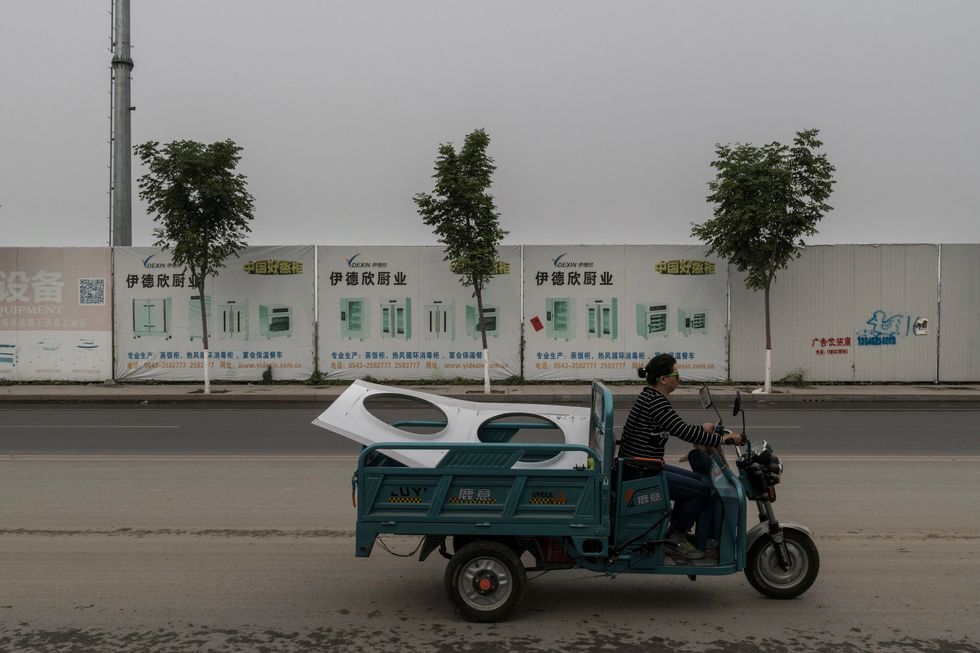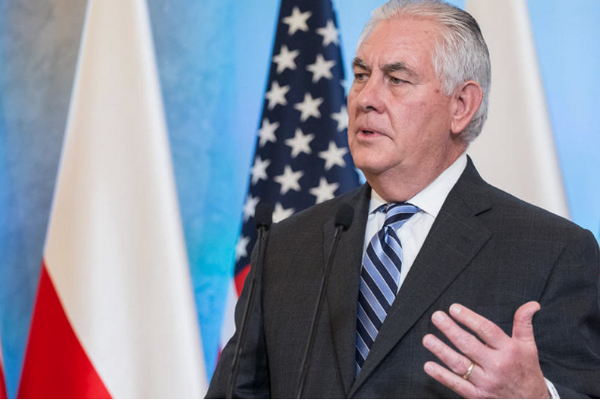ehn.org
Year-in-review: Integrating impact
We've re-framed our storytelling with an eye toward action. And it's working.
As reporters, we're used to asking questions.
When it comes to questions we ask before we even start reporting, two stand out: why is this is a story? And, if the first answer is sufficient, how will we tell it?
This year our small newsroom added another question: What will we accomplish with this reporting?
It's a simple question, but it has transformed our thinking. By asking this question on the front end, and re-framing our reporting with a bias for action, I feel we've had one of our most impactful years of reporting since EHN opened shop more than 15 years ago.
Impact—that's what defines my mission as EHN's editor.
And I don't mean page views, comments on Facebook, or awards. In our coverage of pollutants and environmental injustice this year, we went beyond bringing attention to the issues. We moved the needle toward less human exposure to toxics and correcting injustices.
Let me give you some examples:
- In June, we kicked off our Breathless series, examining off-the-charts asthma rates for Pittsburgh children. Asthma rates often depend on where you live or the color of your skin. Our Pittsburgh reporter, Kristina Marusic, tracked down every politician and city official that has the power to make a change on this issue, forcing them to acknowledge and answer for the stark data. Some lawmakers saw the data for the first time. Some gained renewed energy for new bills and policy shifts. And some incoming representatives pledged to make air quality and children's health a priority when sworn into office.
- Our continued, comprehensive coverage of bisphenol-A (BPA) paired our reporting with analyses directly from scientists studying the chemical. As the U.S. Food and Drug Administration continues to promote the safety of BPA in products, health researchers say the FDA conclusion is wrong. We are going to spend 2019 holding the FDA accountable and calling out scientific inconsistencies.
- We highlighted real, on-the-ground solutions to seemingly intractable problems. Lindsey Konkel dove into promising new research cleaning storm water for thirsty cities; Andy McGlashen gave lift to Michigan cherry growers' use of hawks and falcons to reduce pesticide use; our own Kristina Marusic cleared the air on the immediate health benefits for Pittsburgh children when heavy emitting factories shut down. Such solutions-based stories elevate the conversation beyond problem identification and provide a roadmap for policymakers and communities to tackle health and environmental problems.
- Award-winning author Carey Gillam reported on ghostwritten science and false claims from Monsanto on the safety of glyphosate, the active ingredient in its popular weed killer Roundup.
- In an investigation of the long-banned pesticide dieldrin, we found that, despite the chemical still lingering in fish and people that eat them, state agencies were not incorporating the latest science, including links to Parkinson's Disease. We took that science to the impacted states, and now officials overseeing those advisories have the information to better protect people.
These are a handful of the more than 260 stories and columns our small, dispersed (highly-caffeinated!) team published this year.
And we're damn proud. We remain as dedicated as ever to objective journalism—but fully acknowledge that speaking truth to power is more important than ever as those in power increasingly try to create their own truth.
In the coming year, several initiatives will further our mission of driving science into public discussion and policy on environmental health issues:
- We are planning to expand our environmental justice reporting in areas that fall outside the scope of mainstream media, working directly with reporters who live in and best know these communities. Check out this recent example from Birmingham, Alabama.
- We are conducting multiple investigations into how science is—and often isn't—used at the state and federal level to protect public health. We'll continue to report on the science—but we're also peeking behind the curtain to document the manipulation of studies and, in some ignored communities, taking research into our own hands.
- We are plotting ways to take environmental health data, synthesize it, and offer it to readers free of charge. Check out this recent example of mapping California respiratory deaths.
- We are looking to further tailor our suite of newsletters so we give you the news you want and need.
It is an exciting time at EHN and we remain grateful for your attention and your continued support.
We're wishing you all happy, health holidays and, to borrow a phrase from longtime reader and donor, George Ball, Jr., "Go get 'em!"—because that's exactly what we'll be doing in 2019.
Ozone and alcohol: Two must-read stories for your week
An environmental whodunnit tracks illicit manufacture of banned CFCs to China, while a former Senate Finance staffer finds a flood of corporate money influencing National Institutes of Health research.
The news deluge is so constant that sometimes important stories get buried before you have a chance to see 'em. Here are two we saw over the weekend that are worth your time this week.
In a high-stakes environmental whodunit, many clues point to China

A troubling rise in a class of pollutants banned worldwide in the 1980s has flummoxed scientists. The compounds – CFCs – chewed a hole in the Earth's protective ozone layer. The ban that stopped the destruction – the Montreal Protocol – was so successful that scientists figured the hole would be repaired by mid-century.
But someone, somewhere was manufacturing the industrial gases, specifically CFC-11. And the rise was so rapid and so big that scientists now say progress on closing the hole over Antarctica is now delayed by at least a decade.
The New York Times, working with undercover sleuths at the watchdog group Environmental Investigation Agency, tracked those fugitive emissions down to a "scrappy, industrial boomtown" in rural China that produces foam for refrigerators and buildings.
Key quote comes from Zhang Wenbo, owner of a refrigerator factory in Xingfu, in Shandong Province
"You had a choice: Choose the cheaper foam agent that's not so good for the environment, or the expensive one that's better for the environment. ... Of course, we chose the cheaper foam agent."
Many manufacturers, NYT reporters Henry Fountain and Chris Buckley report, had no idea the compound was banned. CFC-11 is readily available in China, they report, and even after a crackdown by local authorities, a robust market remains for the ingredient.
CFC-11 is a potent greenhouse gas as well, and Avipsa Mahapatra, EIA's climate policy lead said in a press release that stopping the rogue CFC manufacture is equivalent to taking 400 coal plants offline by 2030.
Our findings and other well placed sources in the Chinese chemical industry strongly suggest that this is a wider practice and could explain the majority of the rogue atmospheric emissions found in the study. This could undermine not just the slowly healing ozone but also the global efforts to battle climate change.
The full story is a worthy, shocking read.
How a flood of corporate funding can distort NIH research

This month the National Institutes of Health shut down a study on alcohol consumption funded mostly by beer and liquor companies. An ethical problem averted?
Not quite. Writing in The Washington Post, Paul Thacker, a freelance writer and former staffer with the Senate Finance Committee, traces intellectual corruption much, much deeper at the agency that sets the bar for government research.
"I spent 3 1/2 years as a Senate investigator studying conflict-of-interest problems at the NIH and the research universities it funds," he writes. "During that time, I found that the agency often ignored obvious conflicts. Even worse, its industry ties go back decades and are never really addressed unless the agency faces media scrutiny and demands from the public and Congress for change."
Tobacco's influence in smoking studies is well known. But similar bias, Thacker notes, "has been found in research funded by pharmaceutical, chemical and pesticide companies." Coca-Cola, he adds, sought to fund scientists who would shift discussion away from sodas' role in obesity and instead blame lack of exercise.
The bottom line is money. As Congressional funding for science declines, Thacker notes, academics have been forced to collaborate with industry.
Read the full story on The Washington Post.
EPA: Pruitt is expected to restrict science. Here's what it means
Weekend Reader, Sunday March 18
Rex Tillerson's Greatest Hits, Volume One: The oil boss before, and during, his brief tenure in government.
If you read Steve Coll's 2012 book Private Empire, you might come away with the impression that Rex Tillerson was a more effective diplomat as ExxonMobil CEO than he was as Secretary of State.
Coll makes a convincing case that Exxon functions as a sovereign nation, using its economic and political clout to get its way, particularly in oil-bearing developing nations. The book covers most of Tillerson's decade-long reign at Exxon, as well as that of his predecessor, Lee "Iron Ass" Raymond.
Tillerson's corporate grandeur – his last known compensation package was $27 million a year, with access to nearly a quarter billion in Exxon stock – shrank to a $187,000 government salary, with benefits including being humiliated by the Commander-in-Chief.
In early October, President Trump used his favorite diplomatic pouch – Twitter – to tell Tillerson to "not waste his time" with diplomacy toward North Korea. Ouch.
Soon after, Tillerson reportedly called his boss a "f*cking moron." When questioned about the alleged statement, he didn't confirm or deny. Trump responded in an interview with Forbes, challenging his Secretary of State to an IQ test.
In his Exxon career, Tillerson issued lukewarm acknowledgements of the human influence on climate change even while ExxonMobil funded candidates, advocacy groups, and at least one scientist working to deny climate impacts. The Los Angeles Times and Inside Climate News published investigations revealing that Exxon knew of the dangers of climate change for decades. The Climate Investigations Center released documents linking scientist Willie Soon's funding from Southern Company and ExxonMobil to Soon's scientific papers with cooked-to-order conclusions.
Both before and after his rise to CEO, Tillerson traveled the petro-world to cut deals with many of the 200 nations where Exxon does business. He developed particularly strong ties with Russia, and built partnerships between ExxonMobil and Rosneft, a state-owned oil company. In 2013, Russian President Vladimir Putin awarded Tillerson the Russian Order of Friendship.
Tillerson's Exxon maintained its status as a prime environmental villain, even as it embraced a couple of pro-environment positions. Since 2007, the oil giant has also voiced at least tepid support of a carbon tax.
In 2012, Tillerson endorsed the Law of the Sea Treaty, which would offer some protection against a free-for-all in fisheries or seabed mining. In 2014, the CEO of America's largest natural gas producer joined his affluent neighbors in a lawsuit to halt construction of a water tower intended to serve fracking operations near the affluent enclave of Bartonville, Texas. The 180-foot tower would have been within sight of Tillerson's 83-acre horse farm.
The apparent hypocrisy of a fracking baron practicing NIMHBY (Not In My Horses' Back Yard) led to a media uproar. Tillerson withdrew from the suit two months later following the wave of bad press. The remaining plaintiffs, led by neighbor Dick Armey, the former House Majority Leader, won. The tower was ordered dismantled.
In his brief government career, Tillerson pushed back against Trump's disdain for the Paris Climate Accord. Compared to his counterparts at Interior and EPA, Rex-T's footprint on global environmental issues was modest—perhaps because dozens of key State Department posts went unfilled, including the two top environment-related sub-Cabinet positions.
As he left the State Department, Tillerson skipped the pro forma thank you to President Trump. Not that he needs the money, but the publisher's advance for a tell-all book on his year in Washington would be immense. I'd put it on my shelf next to Private Empire.
Top Weekend News
A little promising news via the New York Times: China's four-year struggle against pollution seems to be gaining some ground. And from Reuters, China's environment minister promises a greater crackdown on air pollution.
Sign of the times, or greenwash? Norwegian oil giant Statoil is taking "oil" out of its name. But they're not exiting the oil and gas business. (Reuters)
Make Mexico Pay for It: Untreated sewage is turning up in a Mexican border town, just across from a U.S. border town's treatment plant. (The Revelator)
Something else that's bigger in Texas: More first-rate reporting from the Texas Observer and Naveena Sadasivam on the dismal record of the state of Texas in enforcing water pollution laws.
Opinions and Editorials
On the PBS website, economist Robert Stavins argues that Rex Tillerson's dismissal is bad news for US climate policy.
A survey by George Mason University's Center for Climate Change Communication reveals obstacles for journalists in reporting local climate change impacts. (Media Matters for America)
Beyond the Headlines: A new milestone for electric vehicles in Japan, the country of Belize declaring 10 percent of their ocean a marine protected area, and look back on the infamous oil tanker, the Exxon Valdez, eventually sold for scrap.
From New York State, the Poughkeepsie Journal urges the state legislature to get its act together on environment.
This Week in Trump
Scott Pruitt's ambition is rumored to have him angling for the Attorney General job. This New York Times piece broadens that ambition to a shot at the Presidency.
Scott Pruitt's plans to de-emphasize science in the EPA's policy decisions. From E&E.
Interior Secretary Zinke stepped in it this week, fumbling an inappropriate response in Japanese during a hearing on World War II internment camp history.
RIP to a Congressional Warrior on Antibiotics
Rep Louise Slaughter died Friday at age 88. This 2015 profile by Julia Belluz in Vox details her relentless effort to combat abuse of antibiotics in agriculture, and the huge commercial forces that opposed her.











